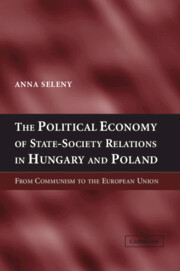 The Political Economy of State-Society Relations in Hungary and Poland
The Political Economy of State-Society Relations in Hungary and Poland Book contents
- Frontmatter
- Contents
- List of Tables
- List of Abbreviations
- Acknowledgments
- The Political Economy of State-Society Relations in Hungary and Poland
- Introduction: Points of Permeable Contact
- 1 History and Theory in Practice
- 2 Precocious Reformer: Hungary
- 3 Injustice: Poland 1948–1980
- 4 Poland: From Solidarity to 1989
- 5 Hungary: Property Relations Recast
- 6 Schumpeter by the Danube: From Second Economy to Private Sector
- 7 Action and Reaction: Institutional Consequences of Private-Sector Expansion
- Conclusion: Despotism, Discovery, and Surprise
- Index
3 - Injustice: Poland 1948–1980
Published online by Cambridge University Press: 23 November 2009
- Frontmatter
- Contents
- List of Tables
- List of Abbreviations
- Acknowledgments
- The Political Economy of State-Society Relations in Hungary and Poland
- Introduction: Points of Permeable Contact
- 1 History and Theory in Practice
- 2 Precocious Reformer: Hungary
- 3 Injustice: Poland 1948–1980
- 4 Poland: From Solidarity to 1989
- 5 Hungary: Property Relations Recast
- 6 Schumpeter by the Danube: From Second Economy to Private Sector
- 7 Action and Reaction: Institutional Consequences of Private-Sector Expansion
- Conclusion: Despotism, Discovery, and Surprise
- Index
Summary
In Poland, as in Hungary, state socialism generated systemic dysfunctions and individual adaptive responses, which in turn subverted the internal logic of the plan and altered the microfoundations of the economy. Consider the following chain-reaction on the supply side. Planners imposed either exacting production quotas or output targets on state firm managers, which the latter tried to meet by assiduously collecting both material inputs and workers. But workers responded by hoarding their own labor power. Doubly constrained in this way, managers perpetually sought to bargain up workers' productivity and to bargain down planners' exigencies. Now consider consumption. Chronic shortages of goods and services led consumers to seek relief in informal structures of market exchange. These informal structures, however, could only be effective if protected by participants from the punitive power of a disapproving state. Participating economic agents minimized this peril by creating and entrenching networks of complicity, trust, and mutual masking. In so doing, they altered the very foundations of the economic system by replacing the mass of selfless, passive consumers envisioned by the party with dense groupings of day-to-day tacticians.
In these profound ways, the Polish and Hungarian stories of internal transformation are quite similar. But if in Hungary, citizens' adaptations from below interacted with increasingly liberal state policies to foster a differentiated second economy, in Poland, orthodox (or at best highly contradictory) state policies actually debilitated private agriculture, fomented the largely speculative character of the illegal non-agricultural economy, and left both the illegal and legal segments of the second economy poorly integrated with the state sector.
- Type
- Chapter
- Information
- The Political Economy of State-Society Relations in Hungary and PolandFrom Communism to the European Union, pp. 77 - 102Publisher: Cambridge University PressPrint publication year: 2006


